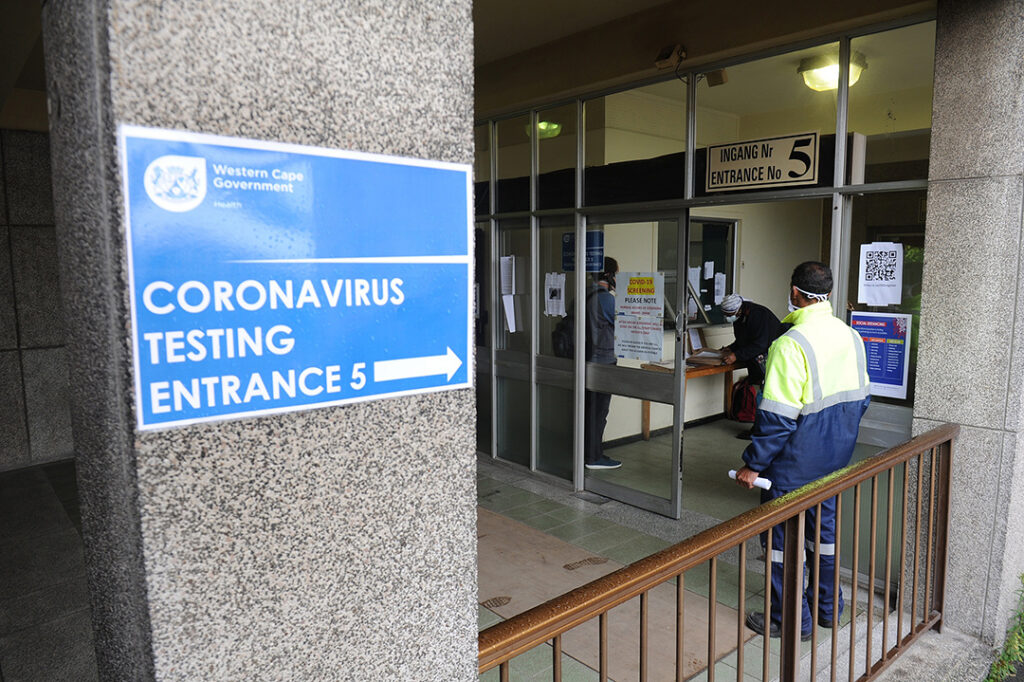ADF STAFF
Public health experts in Africa say COVID-19 is far from finished, but the path of the pandemic remains uncertain.
“We should not be deceived that because we’re in a low transmission season in Africa and around the world, we won’t see the pandemic rebound,” Dr. John Nkengasong, director of the Africa Centres for Disease Control and Prevention (Africa CDC), said during a recent news briefing. “We’ve seen this scenario over and over.”
According to the World Health Organization (WHO), Africa’s COVID-19 infections in mid-April were at their lowest levels since the pandemic began in early 2020. Now is the most important time for countries to press ahead with testing, surveillance, and measures such as hand-washing and masking in confined spaces, Nkengasong said.
This also is the time for countries to begin boosting their public health infrastructure, he added, citing the Nigeria Centre for Disease Control as a model for other countries to follow.
“Every country should have a version of the Nigeria CDC,” Nkengasong said, adding that just 16 African countries have a national health institute.
The virus has shown itself capable of mutating rapidly — sometimes into deadly strains such as the delta variant and other times into milder versions such as the omicron BA.2 lineage now present in at least 16 African countries.
In the long run, however, increasing immunity — either natural or acquired — can reduce the overall impact that COVID-19 has on the world’s population, according to Dr. Crystal Watson, senior scholar at the Johns Hopkins Center for Health Security.
Studies suggest that up to 60% of Africans have been exposed to COVID-19, granting them some level of immunity. In South Africa, the estimate is closer to 80%.
Experts at the WHO and Africa CDC say countries need to continue to support testing and surveillance to track the spread of the virus and alert the world to any potentially harmful variants. Tests are trending down along with cases, according to the Africa CDC.
“We’re still seeing hotspots despite the decline in testing,” said Dr. Maria Van Kerkhove, technical lead for COVID-19 at the WHO, during a recent briefing.
Public health leaders say COVID-19 remains an emergency and shows no signs of reaching the point when it can be declared endemic. A disease is considered endemic when it persists in a population or region but generally has settled to a constant rate of occurrence. Even when it reaches that point, the virus will remain a potentially lethal risk for the elderly, the very young and those with compromised immune systems, experts say.
“Endemic does not mean it’s over,” Dr. Mike Ryan, executive director of the WHO’s Health Emergencies Programme, said at the briefing. “Endemic does not mean it’s mild. There are many endemic diseases that are killing people all over the world.”
The WHO and Africa CDC have pushed for more self-testing with antigen tests, similar to the process used for HIV testing. Those tests aren’t always reported in national totals, however, Van Kerkhove added.
As part of preparing for the next phase of the pandemic, the Africa CDC has expanded the continent’s capacity for detecting variants, but much more work remains, according to Nkengasong.
The Africa Union recently announced a team charged with expanding the ranks of Africa’s doctors, health care workers, and researchers to address this and future pandemics. Morocco’s permanent representative to the AU, Ambassador Mohamed Arrouchi, has called for the Africa CDC to report on the condition of the continent’s health infrastructure to help health ministries monitor the pandemic.
Along with more medical personnel, the continent also needs to develop its own supply of key commodities, such as protective equipment and anti-COVID-19 medications, experts say.
“You can’t fight the virus without commodities and health workers,” Ryan said. The pandemic has revealed longstanding inequities in the global health care system, he said.
Among the inequities the WHO and African leaders want to correct is the lack of homegrown medical technologies and supplies. Africa has suffered from a lack of both during the pandemic, Ryan said.
Changes already are underway, driven largely by the pandemic. Since COVID-19 began, Africa has more than doubled its supply of intensive care beds, from eight per 1 million patients to 20. Medical oxygen generating plants have expanded by 60%, driving down the price, although supplies remain a crucial issue, according to the WHO Africa region.
“As we enter this new phase of the COVID-19 pandemic, we must use the lessons learned over the past two years to strengthen our continent’s health systems so that we are better prepared to handle future waves of the disease,” Dr. Matshidiso Moeti, director of the WHO Africa region, said in an April 14 statement.

